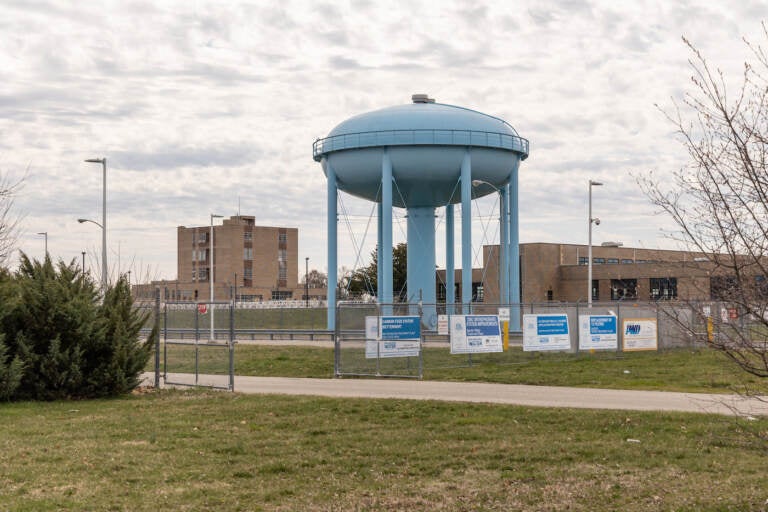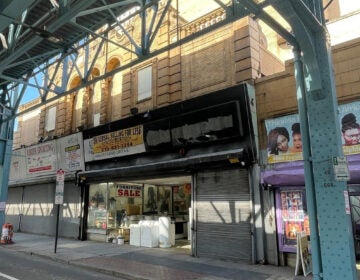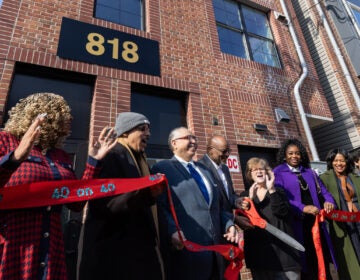Philly plans to revamp its drinking water system. The Water Department wants to hear your thoughts
PWD customers will foot the bill for a massive infrastructure improvement plan. You can learn more about it at a series of upcoming meetings.
Listen 1:09
The Samuel S. Baxter Water Treatment Plant on State Road in Philadelphia, Pa. (Kimberly Paynter/WHYY)
Have a question about Philly’s neighborhoods or the systems that shape them? PlanPhilly reporters want to hear from you! Ask us a question or send us a story idea you think we should cover.
Philadelphians will get a chance to learn more about the Water Department’s massive plan to upgrade the pumps, plants, and pipes that carry water to their homes in the coming weeks.
The Department is launching a series of public listening sessions on its 25-year Water Revitalization Plan on Monday.
“This is the biggest investment we’ve made in a generation in our drinking water treatment plants and system,” said spokesperson Brian Rademaekers. “We want to hear … what people want to know more about, what they’re concerned about, what we can provide them as we do outreach.”
The Water Revitalization Plan, estimated to cost around $2.5 billion, aims to update and strengthen aging drinking water infrastructure, from stations that pump water out of rivers to pipes that carry water across the city.
It includes projects such as adding ultraviolet light treatment to two plants and renovating a reservoir.
Other projects in the plan will boost the resilience of Philly’s drinking water system, allowing the Water Department to serve the entire city with water from just the Schuylkill River or just the Delaware River during an emergency.
Last spring’s water contamination scare, when thousands of gallons of chemicals spilled into a creek that flows into the Delaware River, highlighted a lack of redundancy in the city’s drinking water system. If the chemical spill had entered the drinking water intake on the Delaware River, where the city gets more than half of its drinking water, the Water Department would not have been able to replace that capacity with water from the Schuylkill River or other sources.
The Water Revitalization Plan includes upgrades at the Belmont and Queen Lane water treatment plants on the Schuylkill, a new pipe to connect these plants and new transmission piping in North Philadelphia and Fox Chase. Together, these projects would allow the city to draw its drinking water exclusively from one river or the other indefinitely, the Water Department has said.
“It’s about improving the treatment of the actual water and making it more resilient in how it’s delivered across the city so that when we have incidents like a spill in the Delaware, we can rely on the Schuylkill to provide water for the whole city until after it’s passed,” Rademaekers said.
The Water Department expects to face increasing pressures on its drinking water system in the coming years as climate change brings more intense storms and sea levels rise, slowly pushing salty water up the Delaware River.
The Water Department plans to stagger the series of improvements over 25 years. Work has already started on two pumping stations along the Delaware River and the pipe that will run underneath the Schuylkill River to connect two treatment plants, Rademaekers said. Improvements to the Queen Lane Water Treatment Plant along the Schuylkill will be the last big element of the plan, finishing around 2050.
In addition to the ten main projects outlined in the plan, it includes some 400 smaller projects — including the replacement of water mains that run beneath streets and distribute water to homes, Rademaekers said.
The Water Department plans to fund the plan in part with grants and low-interest loans from the federal government, which will ultimately be paid back by ratepayers. The Department says it has already received part of a $25 million state grant and $320 million in loans for the plan, and will identify the rest of the funding as future capital budgets are developed.
“We kind of want to let people know about the general plan because it’s really their water bills that’s going to be funding it,” Rademaekers said.
Officials will not be able to provide people who attend the listening sessions info about future water bill increases, Rademaekers said. Instead, the public listening sessions occurring March 4 through April 11 will cover a “general overview” of the plan, with officials on hand to answer questions.
Officials are looking to learn residents’ top questions and concerns, Rademaekers said. Future public input sessions will be held about specific projects as they move toward implementation.
“[Residents who] will be in close proximity — they might see trucks. They might see work going on. So in those cases, … residents do have opportunities to shape the work that we’re doing,” Rademaekers said. “But … in some ways, the grand scheme of things is set.”
The Department will hold both in-person and virtual listening sessions, mostly on weeknight evenings, with one on a Saturday afternoon. The full schedule is posted on the Water Department website.

Subscribe to PlanPhilly
WHYY is your source for fact-based, in-depth journalism and information. As a nonprofit organization, we rely on financial support from readers like you. Please give today.









